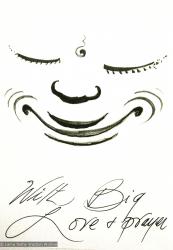
One of the fundamental problems in our life is the concept of permanence, apprehending phenomena—which are in the nature of impermanence—as permanent.
We ourselves, our own life, our body, enemy, friend and stranger, the sense objects and so forth—all these things are in the nature of perishing, in the nature of changing within every second and can be stopped at any time.
However, we apprehend them all the time as permanent, as unchangeable.
We apprehend that they will last, that they will be like this all the time. They are like this now and we think they will be always like this, forever. By incorrectly apprehending how they exist, we think, “I will have these things forever. I will have these possessions, I will have these friends, I will have this and that.” We think that they will continue to exist, that they’re going to be like this all the time, as they are now.
We live our life with this concept of permanence, looking at these things in a way that is not true, believing in it. Looking at these things in the wrong way, seeing things that don’t exist as existent, is a hallucination; this is not reality.
Therefore, when we discover the gross changes, when we come to understand the gross changes when these things get stopped, when they cease to exist, it becomes a great shock. It becomes a great shock. Suddenly life becomes a great shock and we have great fear. When these things happen, when we discover these things, which are opposite to our concept of permanence, we see they don’t exist in reality. Suddenly life becomes kind of depressed or crazy. We are unable to cope with the situation, unable to handle it. When these gross changes happen, when we see them, these problems arise.
This concept of permanence becomes the basis for the dissatisfied mind, which leads to attachment, anger and so forth. This concept of permanence becomes the basis of life’s problems, the basis of life’s pain. It’s the basis of relationship problems, loneliness and so forth, all these problems that constantly cause people to ring up, day and night, to talk about their problems.
What’s it called where people ring up? A talk-back radio program. I listened to a little bit of that in Sydney, Australia, where people rang up with their various problems. In the nighttime, you go to one place and then people ring up constantly to talk about their problems, while one person listens. They want to express their problems to somebody; they need to talk to somebody.
All these things are based on this, the wrong conception, the concept of permanence, apprehending these causative phenomena as permanent. Looking at these things in the wrong way, in a way that doesn’t exist. First of all, if we live our life with the concept of permanence, having the concept of permanence, that mind under the control of the concept of permanence is itself a painful mind. When the mind is controlled by the concept of permanence, life becomes confused, and that brings suffering into our life.
Then those other, different disturbing thoughts arise and that brings our life more problems.
On the other hand, practicing awareness, living our life with awareness, with right understanding, brings freedom. Seeing causative phenomena—the self, our own possessions, our body, the surrounding people and so forth—seeing these causative phenomena are in the nature of impermanence, we see them as they are.
Seeing them in the nature of impermanence means that we see them as they are in reality.
This gives us freedom. The other one ties us into the prison of anger, attachment and so forth. It keeps our life in suffering, with problems.
Now here, with this awareness, with the thought of impermanence and death, it gives freedom. It releases us from the confused mind, the afflicted mind, from the discriminating thought, anger, attachment, ignorance and the concept of permanence. Because it frees us from the cause of suffering it frees us from life’s problems. This comes as soon as we pay attention to, as soon as we meditate or reflect on the impermanent nature of these phenomena, how they are in the nature of changing within every second, and how they can be stopped at any time.
As soon as we reflect on this, the dissatisfied mind of desire stops immediately. Immediately it stops that dissatisfied mind. Immediately it stops that. Because of that, immediately there’s peace in our heart. Immediately there’s peace in our heart, there’s happiness or relaxation in our heart.
What is peace? What is happiness in life? Real happiness in life, peace of mind? That is the absence of dissatisfaction, of desire. Real peace of mind is that. Real happiness is that—the absence of dissatisfaction, the absence of desire. Therefore, when we reflect on the nature of impermanence and death, the nature of the life, the nature of the causative phenomena, impermanence—that these things can be stopped any time—the dissatisfied mind of desire, attachment, immediately gets stopped. There’s no place in the mind for it.
That’s why the meditation on, or the realization of, impermanence and death is the source of happiness in life. That is the fundamental method or source that gives us great freedom in life. If we really want freedom, if we really want liberation, we need to practice the awareness of this.
We should achieve the realization of the impermanence and death if we really want real peace of mind in life, real happiness.

Read more from this Lama Zopa Rinpoche teaching here.
Images: 1 by Marc Sakamoto, 2 by Robin Bath, 3 Lama Zopa Rinpoche ArtWork
Author: Lama Yeshe
Editor: Renée Picard
Image: via the author











Read 2 comments and reply